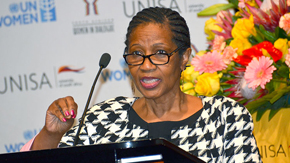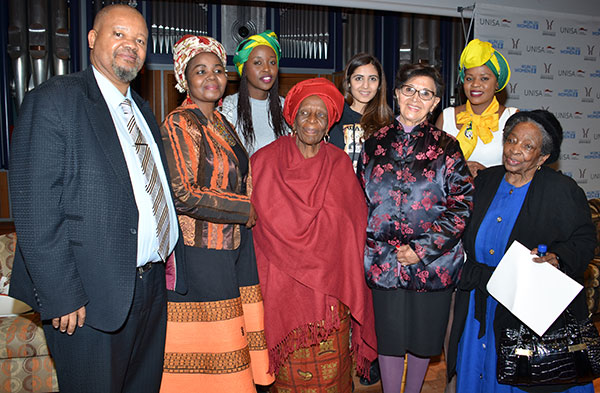News & Media
Gender-based violence requires unity amongst women

Former deputy president Phumzile Mlambo-Ngcuka (Under-Secretary-General of the United Nations (UN) and the Executive Director of UN Women) addressed the Unisa-South African Women in Discussion (SAWID) Women’s Month event celebrating 60 years of women’s collective activism for social change.
You strike a women, you strike a rock.This was the slogan that saw women from different racial divides forge a unity to fight against the discriminatory laws that were the hallmark of the apartheid regime. Although apartheid has been abolished, rape culture, violence against women and children, and persisting patriarchal relations call upon women to unite. This was the message from Under-Secretary-General of the United Nations (UN) and Executive Director of UN Women, Phumzile Mlambo-Ngcuka. She was speaking on 12 August 2016 during the Unisa-South African Women in Discussion (SAWID) Women’s Month event celebrating 60 years of women’s collective activism for social change.
Mlambo-Ngcuka paid tribute to women who marched in 1956 to the Union Building demanding the end of discriminatory laws, including the carrying of the dompas imposed on women.
Mlambo-Ngcuka said South Africa tops the list of countries that have the highest number of female representatives in organs of state, including in parliament. She said, however, that although there had been major gains in advancing women’s rights, the prevailing rape culture and violence against women was a worrying phenomenon.
“One area that demonstrates that we haven’t arrive is the level of violence against women and girls in our country. In 2016, how is it that with the kind of the constitution that we have, women are still beaten up and raped, and perpetrators get away with it,” she asked.
She said women are still subjected to horrific treatment, even by their intimate partners and employers who paid them less compared to their male counterparts. Mlambo-Ngcuka also slammed what she calls lack of support amongst women, saying it is disturbing that women don’t support each other despite that their challenges are common.
She lamented that universities have also become a places of fear, citing rape culture and sexual harassments as practices which are kept under wraps. The issue of sexual harassment and rape culture in universities was source of unrest in some institutions early this year, when students shut down universities accusing management of being lenient towards perpetrators.
She called upon women to unite in order to fight patriarchy and to alter the economic ownership patterns, which is largely male dominant and to sway policy direction in their favour. She said the National Development Plan (NDP) and the Africa Agenda 2063 are strong in terms of youth participation. She urged women to interrogate the economic chapter in order to align it with their interests.
Jennifer Schreiner, Director-General of the Department of Women, spoke on behalf of Minister Susan Shabangu. She said that the struggle of women deserved to be remembered for more than a month. “It should be #365 days in which we should tell HERstory.” She noted that while it was important not to forget what women in the country’s past had gone through, it was also important to continue speaking of their experiences. “HERstory must also be told as it unfolds,” she concluded.
The event was round off by panelist discussions centered on pertinent issues that continue to define the life experience of many women, including teenage pregnancy and economic empowerment. The panel was drawn from the veterans of the 1956 Women’s March and the #FeesMustFall campaign to ensure intergenerational talks.
Sophia Williams-De Bruyn, only surviving leader of the historical event, took the audience down memory lane, unpacking the nitty gritty of the 1956 march. She called on women to unite and emulate the generation of 1956. “I am a living witness of the 1956 March. We fought for a non-racial society coming from various backgrounds. Women should come together to fight gender violence and rape, irrespective of colour, because these challenges know no colour.”

Prof Mandla Makhanya, (Principal and Vice-Chancellor, Unisa), Dr Vuyo Mahlati, (Trustee: SAWID), Nompendulo Mkatshwa (SRC President: University of the Witwatersrand), Violet Sarah Matlou (1956 Women’s March Veteran), Shaeera Kalla (former SRC President: University of the Witwatersrand), Sophia Williams-De Bruyn, (1956 Women’s March Veteran), Nontsikelelo Nako (Deputy Secretary General: National SRC, Unisa), and Thandi Emma Mashinini (Women Activist Veteran)
Publish date: 2016/10/17

 Unisa co-hosts G20 community outreach in the Eastern Cape
Unisa co-hosts G20 community outreach in the Eastern Cape
 Unisans gain membership of prestigious science academies
Unisans gain membership of prestigious science academies
 Advocating for disability transformation through servant leadership
Advocating for disability transformation through servant leadership
 Unisa Press continues to illuminate the publishing space
Unisa Press continues to illuminate the publishing space